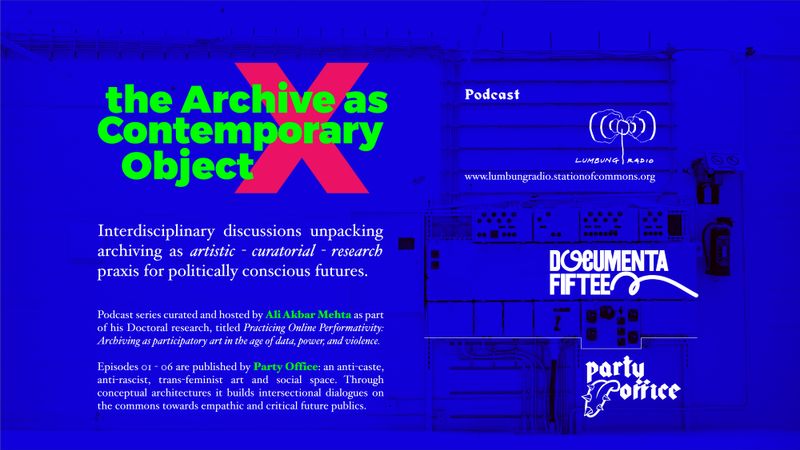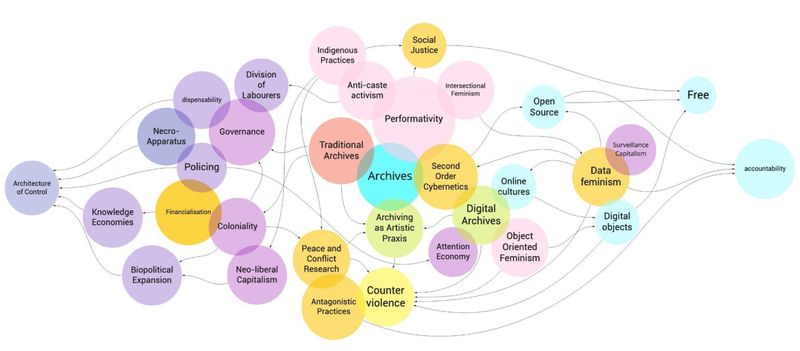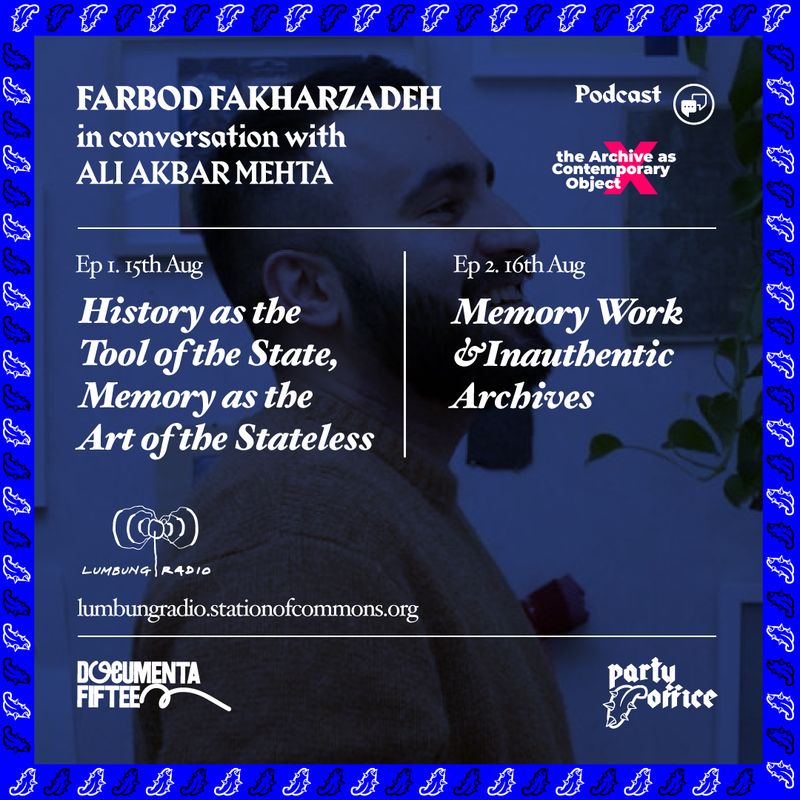
Archives as Contemporary Object 'X'
Podcast series
The Archive as Contemporary Object ‘X’ (ArCo-X) is a podcast series project that investigates through discourse, the nature of the archival today, seeking to unpack the several system issues affecting the world around us, through a multifocal lens of archiving as artistic, curatorial, and research praxis. In these critical discussions, the invited speakers – critical thinkers, media theorists, data law and policymakers, social activists, political theorists, art and cultural workers, as well as the moderator/hosts – will examine how data censorship, power/knowledge matrix, and direct, structural, and cultural forms of violence affect the way we interface with data and shape our online archives. The project is crucial in consolidating the active and present voices to reveal how ‘queer anti-racist post-internet aesthetics’ may be utilised to create ‘Politically Conscious Archives’ for the future: as open-source, free, online platforms.
The first six episodes were broadcasted biweekly, from August to September 2022, as part of online programming for Party Office on lumbung.radio, during documentafifteen.
About Archives as Contemporary Object (X)
ArCo-X
As a project, ArCo-X is based on the premise forwarded by Anne-Françoise Schmid, who claims that “today we are faced with objects that are, at once, acts of aggression and choreographed performances and technological simulations and training exercises. We have to find a new way to describe such objects; in a certain sense, they exist in a properly interdisciplinary or non-disciplinary place, a place described by the points at which they become unknown to each discipline. (schmid: 2021)

The Archive is such an object, that as a field of study can no longer neatly fit within its own domain. Despite a division into various sub-disciplines, there still exist too many gaps through which a comprehensive and contemporary understanding of archives elude us.
A critical starting point for mapping this new ecology of data archives lies in recognising and addressing the key issues of our age, where we are living in the age of rising ethnofascism and disintegrating democracies, where conflicts, pandemics, human crises have become just another tool for capitalist societies to recycle pain. There is increasing information overload; online interfaces for knowledge are steadily becoming opaque; and the data we produce serves the capitalist pursuits of Surveillance Empires, corporations and necropolitical governments. By declaring ownership of their users’ data, and engaging in behavioural manipulations for data extractivism, Surveillance Empires have forced the creation of new categories to explain the production and accumulation of ‘value’ in capitalism: such as Attention Economy (Davenport & Beck: 2001; Celis Bueno: 2017); Surveillance Capitalism (Zuboff: 2019), and Computational Capitalism (Beller: 2018). This, in turn, reshapes political world orders based on disenfranchisement, creating necropolitical governments of management, techno-legal architectures of control, and legalised policing of ‘Direct, Structural, and Cultural Violence’ – the age of ‘Planetary Entanglement’ (Mbembe: 2021).
Archives, fortified through multiple performativities, as ‘politics of knowledge’; ‘knowledge economies’; and ‘power-knowledge relations’; become a ‘productive force’ for biopolitical apparatus (Agamben: 2009). Such apparatus, as a Foucauldian machinery of governance, is not fixated on security or welfare but on the premise of dispensability (Mbembe: 2019). The project seeks to centralise the ‘dispensable bodies, objects, data, and networks’ as key subjects, to reveal dominant narratives and the structural management of violence through their interactions with systemic conditions like globalisation, financialisation, socio-political issues of gender, class, race, caste, class, as histories of oppression.
Yet, an online user’s participation can cultivate or disrupt the commodification of data on the Net. Archives, especially those created online, have the potential to counter traditional understandings of power. ArCO-X, as interdisciplinary conversations will provide a techno-political map for creating politically conscious archives: archives that articulate the current paradigm shift in our understanding of the political, and that as witnesses, embody the responsibility of giving testimony to histories or truths of occurrences, seeking to re-imagine the ‘archives’ as spaces for confrontation and dissonance, fundamentally altering the capacity of us as users “to be active participants in the public sphere as opposed to its passive readers, listeners, or viewers”. It is positioned as an appeal for archives as being not burdened only with the past and the idea of memory, but as containers of imagination – through which we may envision politically conscious futures.
______
- Anne-Françoise Schmid, On Contemporary Objects. 2012. Accessed 17, March 2021.
- https://primer.dk/onsite/Projects/Ripe/Anne-Francoise-Schmid-On-Contemporary-Objects-2012
- Agamben, Giorgio. What is an Apparatus and Other Essays?. (trans.) David Kishik and Stefan Pedatella, Stanford University Press (Stanford: California). 2009
- Mbembe, Achille. Necropolitics. (trans.) Steven Corcoran, Duke University Press (Durham and London), 2019 Mbembe, Achille. The idea of a Borderless Word. lecture at Rokoko hall of the Government of Swabia, 2018
- Vishmidt, Marina. 2017. Between Not Everything and Not Nothing: Cuts Towards Infrastructural Critique. In: Maria Hlavajova and Simon Sheikh, (eds.) Former West: Art and the Contemporary After 1989. Cambridge, MA: MIT Press.
- Zuboff, Shoshana. The age of surveillance capitalism: the fight for a human future at the new frontier of power. Profile Books, 2019
Episode 01: History as the Tool of the State, Memory as the Art of the Stateless
Farbod Fakharzadeh in conversation with Ali Akbar Mehta, part 01
Broadcasted on 15.08.2022, at 22:00 EET.
Archived on lumbung.radio

“I or people like me, we’re not the subject of that history. We are objects of that history. We are not the ones doing things, we’re not really actors in that history. This history is just things that happened to us. So that’s when I was searching for something else, I think for another space in which to think about the past, think about the experiences, think about previous events, but not through that gaze, not through that thing which in itself has the idea of othering and which in itself has the idea of us and them. And in order to find that space that’s when I found the space of memory. Of course, the space of memory is something that has been worked with for eternity. It’s a very big concept in a lot of communities that haven’t been in the ones that have power or aren’t the rulers of history or rulers of how history is written. You can find traces of that all the way from the black experience in the United States to the Jewish diaspora experience, to today the Palestinian experience, to the indigenous struggle. They all are spaces that work with memory and memories are what have saved them. Memories are what has given them this moment of reflection and this moment of connection because they are ruled by histories that don’t really treat them like subjects, but rather objects.”
In this inaugural episode of The Archive as Contemporary Object ‘X’, we speak with artist, curator and storyteller Farbod Fakharzadeh as he talks about his practice, new projects, the politically charged relationship between history and Memory, and his own situated relationship to them.
Farbod Fakharzadeh is an artist, curator and storyteller based in Helsinki, Finland. His work deals with concepts of the archive, memory-work and history-politics and revolves around notions of collective construction and alternative ways of working and dreaming together. He currently serves as the co-artistic director for Catalysti, a support organization that advocates for transcultural artists living and working in Finland and works as a curriculum advisor for Node centre for curatorial studies in Berlin, Germany.
Ali Akbar Mehta (b.1983, Mumbai) is a Transmedia artist, curator, researcher, and writer. His research-based practice is to create immersive, interactive archival projects that map knowledges through a multifocal lens of violence, conflict, and trauma. His work as performances, installations and talks have been exhibited in galleries and alternative spaces in India and Europe. He is a co-founder of the Museum of Impossible Forms and was its co-Artistic Director (2018-2020), serves on the boards of TKOK ry (2021-), Frame Contemporary Art Finland (2021-), and is currently pursuing his doctoral research at Aalto University.
The Archive as Contemporary Object ‘X’ (ArCo-X) is a podcast series project that investigates through discourse, the nature of the archival today, seeking to unpack the several system issues affecting the world around us, through a multifocal lens of archiving as artistic, curatorial, and research praxis. In these critical discussions, the invited speakers – critical thinkers, media theorists, data law and policymakers, social activists, political theorists, art and cultural workers, as well as the moderator/hosts – will examine how data censorship, power/knowledge matrix, and ‘direct, structural, and cultural violence’ affect the way we interface with data and shape our online archives. The project is crucial in consolidating the active and present voices to reveal how ‘queer anti-racist post-internet aesthetics’ may be utilised to create ‘Politically Conscious Archives’ for the future: as open-source, free, online platforms.
Party Office is an anti-caste, anti-racist, trans-feminist art and social space. Through conceptual architectures, it builds intersectional dialogues on the commons toward empathetic and critical future publics.
Episode 02: Memory work and Inauthentic Archives
Ali Akbar Mehta in conversation with Farbod Fakharzadeh, part 02
Broadcasted on 16.08.2022, at 09:00 EET.
Archived on lumbung.radio

In the second episode, we continue our conversation with Farbod Fakharzadeh as he talks about Memory work, the potentiality of revolutionary moments and the importance of inauthenticity as a tool to think about archiving knowledges, in order to keep intact its diversities and pluralities.
Farbod Fakharzadeh is an artist, curator and storyteller based in Helsinki, Finland. His work deals with concepts of the archive, memory-work and history-politics and revolves around notions of collective construction and alternative ways of working and dreaming together. He currently serves as the co-artistic director for Catalysti, a support organization that advocates for transcultural artists living and working in Finland and works as a curriculum advisor for Node centre for curatorial studies in Berlin, Germany.
Ali Akbar Mehta (b.1983, Mumbai) is a Transmedia artist, curator, researcher, and writer. His research-based practice is to create immersive, interactive archival projects that map knowledges through a multifocal lens of violence, conflict, and trauma. His work as performances, installations and talks have been exhibited in galleries and alternative spaces in India and Europe. He is a co-founder of the Museum of Impossible Forms and was its co-Artistic Director (2018-2020), serves on the boards of TKOK ry (2021-), Frame Contemporary Art Finland (2021-), and is currently pursuing his doctoral research at Aalto University.
The Archive as Contemporary Object ‘X’ (ArCo-X) is a podcast series project that investigates through discourse, the nature of the archival today, seeking to unpack the several system issues affecting the world around us, through a multifocal lens of archiving as artistic, curatorial, and research praxis. In these critical discussions, the invited speakers – critical thinkers, media theorists, data law and policymakers, social activists, political theorists, art and cultural workers, as well as the moderator/hosts – will examine how data censorship, power/knowledge matrix, and ‘direct, structural, and cultural violence’ affect the way we interface with data and shape our online archives. The project is crucial in consolidating the active and present voices to reveal how ‘queer anti-racist post-internet aesthetics’ may be utilised to create ‘Politically Conscious Archives’ for the future: as open-source, free, online platforms.
Party Office is an anti-caste, anti-racist, trans-feminist art and social space. Through conceptual architectures, it builds intersectional dialogues on the commons toward empathetic and critical future publics.